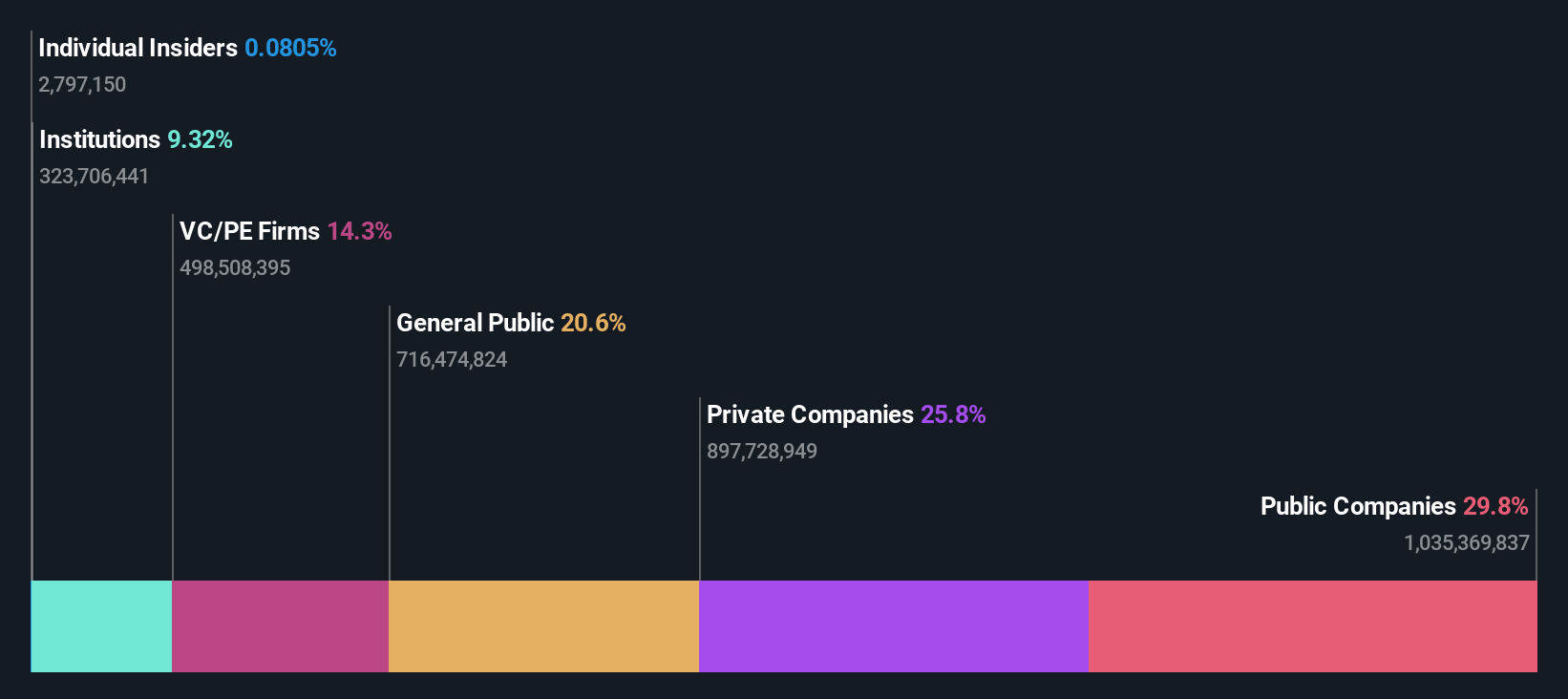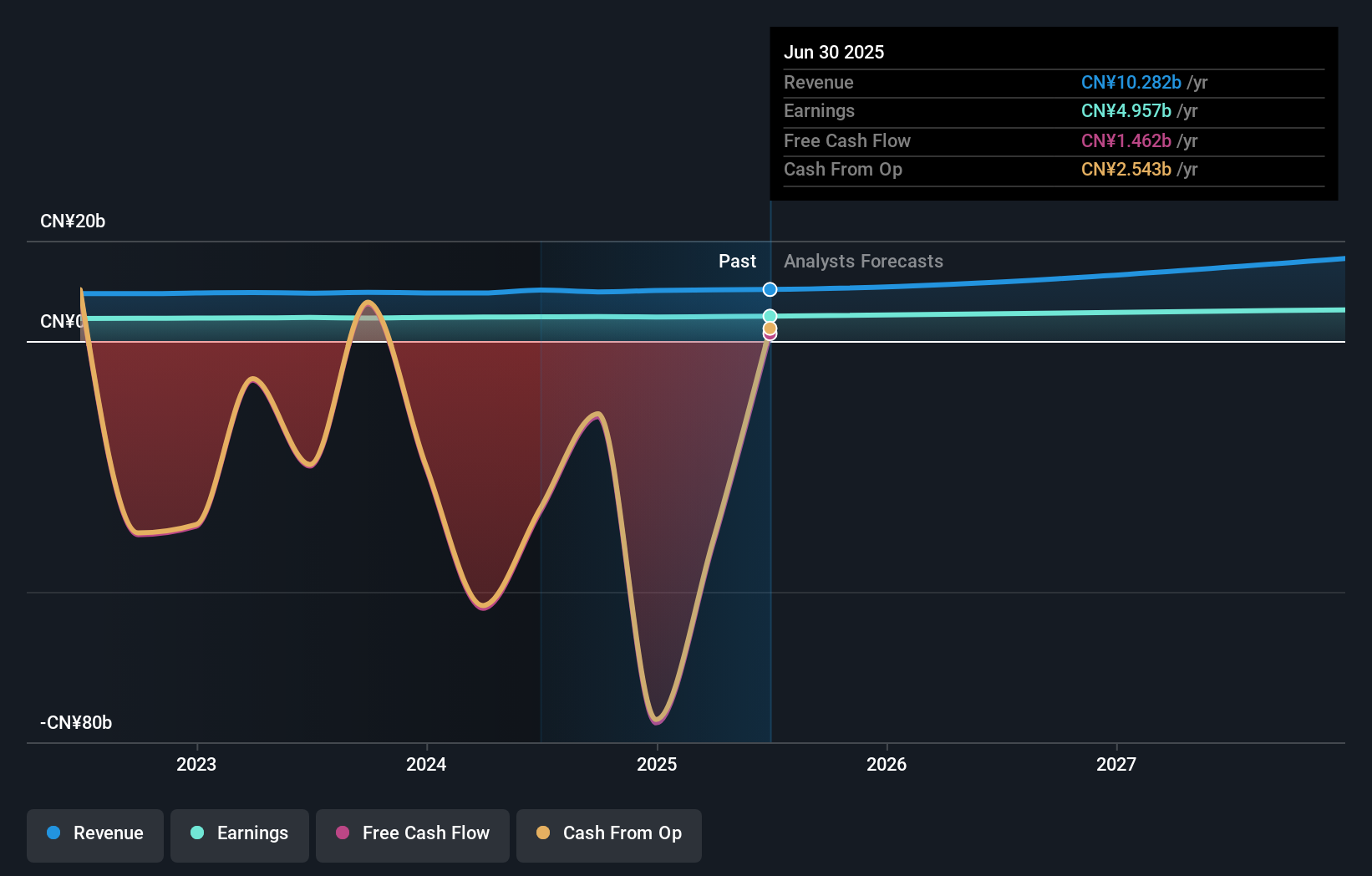Public companies among Bank of Chongqing Co., Ltd.'s (HKG:1963) largest shareholders, saw gain in holdings value after stock jumped 8.0% last week
Key Insights
- Bank of Chongqing's significant public companies ownership suggests that the key decisions are influenced by shareholders from the larger public
- A total of 6 investors have a majority stake in the company with 56% ownership
- Using data from analyst forecasts alongside ownership research, one can better assess the future performance of a company
A look at the shareholders of Bank of Chongqing Co., Ltd. (HKG:1963) can tell us which group is most powerful. We can see that public companies own the lion's share in the company with 30% ownership. That is, the group stands to benefit the most if the stock rises (or lose the most if there is a downturn).
As a result, public companies collectively scored the highest last week as the company hit HK$33b market cap following a 8.0% gain in the stock.
In the chart below, we zoom in on the different ownership groups of Bank of Chongqing.
View our latest analysis for Bank of Chongqing

What Does The Institutional Ownership Tell Us About Bank of Chongqing?
Many institutions measure their performance against an index that approximates the local market. So they usually pay more attention to companies that are included in major indices.
As you can see, institutional investors have a fair amount of stake in Bank of Chongqing. This suggests some credibility amongst professional investors. But we can't rely on that fact alone since institutions make bad investments sometimes, just like everyone does. When multiple institutions own a stock, there's always a risk that they are in a 'crowded trade'. When such a trade goes wrong, multiple parties may compete to sell stock fast. This risk is higher in a company without a history of growth. You can see Bank of Chongqing's historic earnings and revenue below, but keep in mind there's always more to the story.

We note that hedge funds don't have a meaningful investment in Bank of Chongqing. Looking at our data, we can see that the largest shareholder is Chongqing Yufu Capital Operation Group Co., Ltd. with 14% of shares outstanding. With 13% and 8.5% of the shares outstanding respectively, Dah Sing Financial Holdings Limited and Chongqing Afari Technology Co., Ltd. are the second and third largest shareholders.
We did some more digging and found that 6 of the top shareholders account for roughly 56% of the register, implying that along with larger shareholders, there are a few smaller shareholders, thereby balancing out each others interests somewhat.
While studying institutional ownership for a company can add value to your research, it is also a good practice to research analyst recommendations to get a deeper understand of a stock's expected performance. There are plenty of analysts covering the stock, so it might be worth seeing what they are forecasting, too.
Insider Ownership Of Bank of Chongqing
The definition of an insider can differ slightly between different countries, but members of the board of directors always count. Management ultimately answers to the board. However, it is not uncommon for managers to be executive board members, especially if they are a founder or the CEO.
Most consider insider ownership a positive because it can indicate the board is well aligned with other shareholders. However, on some occasions too much power is concentrated within this group.
Our data suggests that insiders own under 1% of Bank of Chongqing Co., Ltd. in their own names. We do note, however, it is possible insiders have an indirect interest through a private company or other corporate structure. Keep in mind that it's a big company, and the insiders own HK$26m worth of shares. The absolute value might be more important than the proportional share. It is always good to see at least some insider ownership, but it might be worth checking if those insiders have been selling.
General Public Ownership
The general public-- including retail investors -- own 21% stake in the company, and hence can't easily be ignored. This size of ownership, while considerable, may not be enough to change company policy if the decision is not in sync with other large shareholders.
Private Equity Ownership
With a stake of 14%, private equity firms could influence the Bank of Chongqing board. Sometimes we see private equity stick around for the long term, but generally speaking they have a shorter investment horizon and -- as the name suggests -- don't invest in public companies much. After some time they may look to sell and redeploy capital elsewhere.
Private Company Ownership
We can see that Private Companies own 26%, of the shares on issue. It's hard to draw any conclusions from this fact alone, so its worth looking into who owns those private companies. Sometimes insiders or other related parties have an interest in shares in a public company through a separate private company.
Public Company Ownership
Public companies currently own 30% of Bank of Chongqing stock. This may be a strategic interest and the two companies may have related business interests. It could be that they have de-merged. This holding is probably worth investigating further.
Next Steps:
While it is well worth considering the different groups that own a company, there are other factors that are even more important. To that end, you should be aware of the 1 warning sign we've spotted with Bank of Chongqing .
If you are like me, you may want to think about whether this company will grow or shrink. Luckily, you can check this free report showing analyst forecasts for its future.
NB: Figures in this article are calculated using data from the last twelve months, which refer to the 12-month period ending on the last date of the month the financial statement is dated. This may not be consistent with full year annual report figures.
Valuation is complex, but we're here to simplify it.
Discover if Bank of Chongqing might be undervalued or overvalued with our detailed analysis, featuring fair value estimates, potential risks, dividends, insider trades, and its financial condition.
Access Free AnalysisHave feedback on this article? Concerned about the content? Get in touch with us directly. Alternatively, email editorial-team (at) simplywallst.com.
This article by Simply Wall St is general in nature. We provide commentary based on historical data and analyst forecasts only using an unbiased methodology and our articles are not intended to be financial advice. It does not constitute a recommendation to buy or sell any stock, and does not take account of your objectives, or your financial situation. We aim to bring you long-term focused analysis driven by fundamental data. Note that our analysis may not factor in the latest price-sensitive company announcements or qualitative material. Simply Wall St has no position in any stocks mentioned.
About SEHK:1963
Bank of Chongqing
Provides various banking and related financial services for corporate and individual customers in the People’s Republic of China.
Flawless balance sheet, good value and pays a dividend.
Market Insights
Community Narratives




